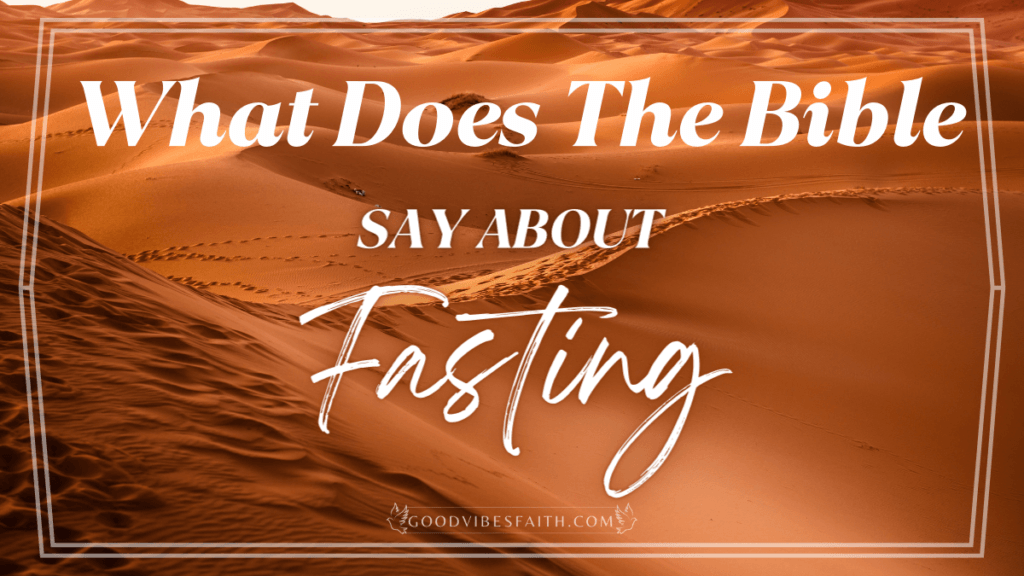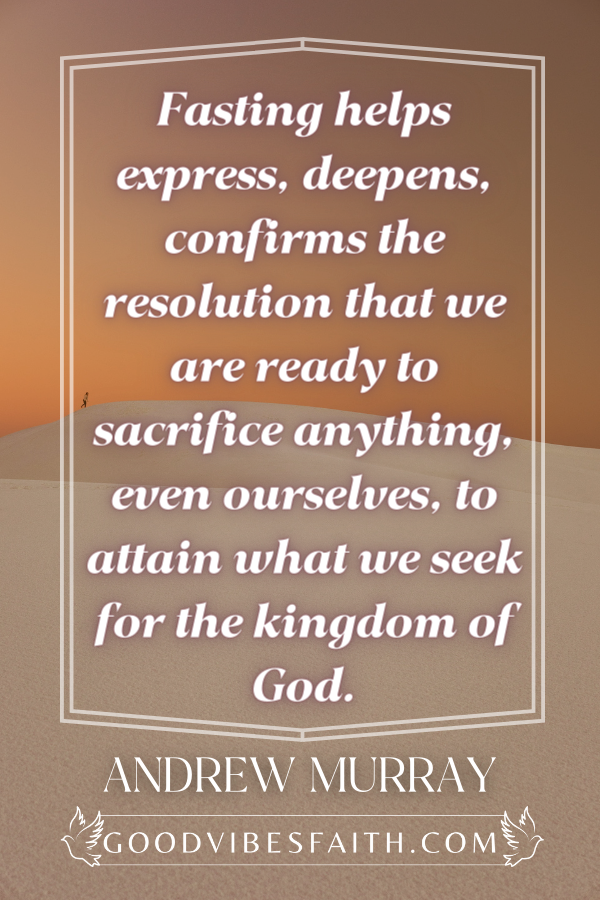What Does the Bible Say About Fasting?

The information provided in this article is for educational purposes only and does not substitute for professional medical advice. Consult a medical professional or healthcare provider before starting any diet or fasting program.
Fasting is a spiritual discipline that is often misunderstood. It is mentioned in the Bible many times and is a practice that Jesus himself engaged in. So what does the Bible say about fasting?
The Hebrew word for fasting is ta’anit, which means to afflict oneself or to humble oneself. It is often used in the Bible as a form of mourning. For example, when the prophet Esther was preparing to approach the king to plead for her people, she and her attendants “fasted for three days, night or day” (Esther 4:16).
The biblical practice of fasting usually involves abstaining from food and drink for some time to focus on prayer and seeking God’s will.
Why Do People Fast?
People may fast for many different reasons. Some people fast as a way to physically humble themselves before God. Others may see it as a way to draw closer to God or to ask for His guidance. Some people may also fast as a form of repentance.
Fasting can also be a way to deny the flesh and its desires. By going without food, we are reminded that we are not dependent on worldly things for our sustenance.
Fasting has been practiced by people of many different religions for centuries. Muslims fast during the month of Ramadan, and some Christians fast during Lent.
What Does the Bible Say About Fasting?
The Bible doesn’t give a specific reason for why we should fast, but it is clear that fasting is a spiritual discipline that is beneficial for believers. In Matthew 6:16-18, Jesus says that when we fast, we should do so in a way that is discreet and not to show off to others. He also says that our fasting should be done for the right reasons – to humble ourselves and seek God’s righteousness – and not for the wrong reasons, such as to display our piety or to draw attention to ourselves.
“When you fast, do not look somber as the hypocrites do, for they disfigure their faces to show others they are fasting. Truly I tell you, they have received their reward in full. But when you fast, put oil on your head and wash your face, so that it will not be obvious to others that you are fasting, but only to your Father, who is unseen; and your Father, who sees what is done in secret, will reward you.” Mathew 6:16-18 (NIV)
There are many examples of fasting in the Bible. In the Old Testament, Moses fasted for 40 days when he was on Mount Sinai receiving the Ten Commandments (Exodus 34:28).
“Moses remained there on the mountain with the Lord forty days and forty nights. In all that time he ate no bread and drank no water. And the Lord wrote the terms of the covenant—the Ten Commandments—on the stone tablets.” Exodus 34:28 (NLT)
In Esther 4:16, Esther fasted for three days before approaching the king to plead for her people.
“Go, gather together all the Jews who are in Susa, and fast for me. Do not eat or drink for three days, night or day. I and my attendants will fast as you do. When this is done, I will go to the king, even though it is against the law. And if I perish, I perish.” Esther 4:16 (NIV)
In 1 Samuel 7:6, the people of Israel fasted and sought God’s help when they were facing defeat in battle.
“ When they had assembled at Mizpah, they drew water and poured it out before the Lord. On that day they fasted and there they confessed, “We have sinned against the Lord.” Now Samuel was serving as leader of Israel at Mizpah” 1 Samuel 7:6 (NIV)
And in Jonah 3:5, the people of Nineveh fasted and repented when they heard Jonah’s message from God.
“The people of Nineveh believed God’s message, and from the greatest to the least, they declared a fast and put on burlap to show their sorrow.” Jonah 3:5 (NLT)
In the New Testament, there are also several examples of people fasting. In Acts 9:9, Saul (later Paul) was fasting for three days after his conversion to Christianity.
“He remained there blind for three days and did not eat or drink” Acts 9:9 (NLT)
In Acts 13:2-3, the church at Antioch fasted and prayed before sending out Barnabas and Saul on their missionary journey.
“While they were worshiping the Lord and fasting, the Holy Spirit said, “Set apart for me Barnabas and Saul for the work to which I have called them.” Then after fasting and praying they laid their hands on them and sent them off.” Acts 13:2-3 (ESV)
And in Matthew 4:1-2, we see that Jesus Himself fasted for 40 days in the wilderness.
“Then Jesus was led up by the Spirit into the wilderness to be tempted by the devil. And after fasting forty days and forty nights, he was hungry.” Matthew 4:1-2 (ESV)
What Are Some Benefits of Fasting?

Fasting can have many different benefits for our lives. When we fast and focus on God, it can help us to grow in our relationship with Him. It can also help us to overcome temptation and to become more self-controlled. Additionally, fasting can give us self-discipline and help us to focus on what is truly important in life, as well as increase power and effectiveness in prayer.
How Can I Fast?
If you’re interested in starting to fast, there are a few things you can keep in mind. First, be sure to ask God if He is leading you to fast. Second, it’s important to be wise in how you fast. If you have any medical conditions or take medication, be sure to talk to your doctor first. And third, be sure to set a realistic goal for your fast. Try starting with one meal or one day at a time, and then gradually increasing as you feel led by the Holy Spirit.
What Should I Avoid While Fasting?
There are a few things to avoid while fasting. First, don’t try to show off or boast about your fast. Second, don’t use fasting as a way to punish yourself. And third, don’t let your fast become an idol that you put before God. Remember, your fasting should be done for the right reasons – to humble yourself and seek God’s righteousness.
What Are Some Common Questions About Fasting?
How Long Should I Fast?
Again, there is no “right” answer to this question. Every person’s situation is different, and you should prayerfully seek God’s guidance on how long to fast. Once again, it would be beneficial to discuss with your doctor before beginning a fast.
What If I Break my Fast?
If you do happen to break your fast, don’t despair! Just pick up where you left off and continue on with your fast. God is more concerned with our hearts than He is with our perfect performance, and He knows that we are human and make mistakes.
What if I Feel Weak or Dizzy While Fasting?
If you feel weak or dizzy while fasting, it is important to listen to your body and take a break if needed. Remember to drink plenty of water, and be sure to eat a nutritious meal as soon as possible after breaking your fast.
What are Some Tips for Fasting?
Here are some tips for fasting:
- Be sure to consult with your doctor first, especially if you have any medical conditions or take medication.
- Set a realistic goal for your fast. Try starting with one meal at a time, and then gradually increasing as you feel led by the Holy Spirit.
- Drink plenty of water while fasting.
- Avoid strenuous activity while fasting.
- Listen to your body, and take a break if needed.
- Be sure to eat a nutritious meal as soon as possible after breaking your fast.
- Pray and seek God’s guidance throughout your fast.
Are There Any Dangers Associated with Fasting?
There are a few potential dangers associated with fasting, especially if it is not done correctly. These dangers include dehydration, electrolyte imbalance, and malnutrition. Dehydration can occur when someone does not drink enough fluids while they are fasting, which can lead to serious health problems. Electrolyte imbalance can happen when someone loses too much water through sweating or urination while they are fasting, which can cause weakness, dizziness, and irregular heartbeat. Malnutrition can occur if someone does not eat enough nutrient-rich foods while they are fasting, which can lead to weight loss, fatigue, and a weakened immune system.
What Principles Can We Glean From These Biblical Accounts About Fasting?
From these biblical accounts, we can glean several principles about fasting:
- Fasting is a personal act of worship to God.
- Fasting should be done in humility, with a sincere heart.
- Fasting is between you and God, and should not be done to impress others.
- God sees and knows everything we do, even the things done in secret.
- God is faithful to reward those who seek Him with sincere hearts.
Conclusion: What Are Some Final Thoughts on Fasting?
Fasting is a personal act of worship to God that can be done in many different ways. There are many benefits to fasting, including physical, mental, and spiritual benefits. It is important to approach fasting with humility and sincerity and to be aware of the potential dangers associated with fasting. If you feel called to fast, there is no one right way to do it. You can tailor your fast to fit your own needs and circumstances, and you can always ask God for guidance. Ultimately, the most important thing is to have a sincere heart and to seek God with all of your heart.







